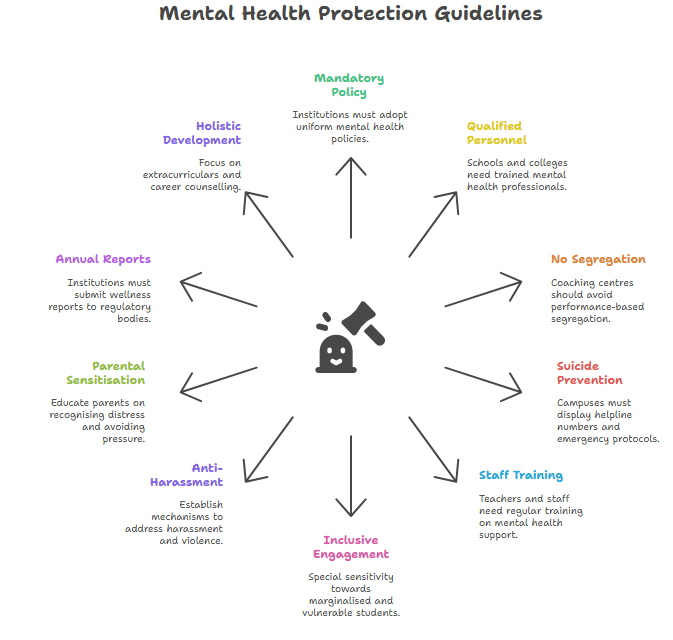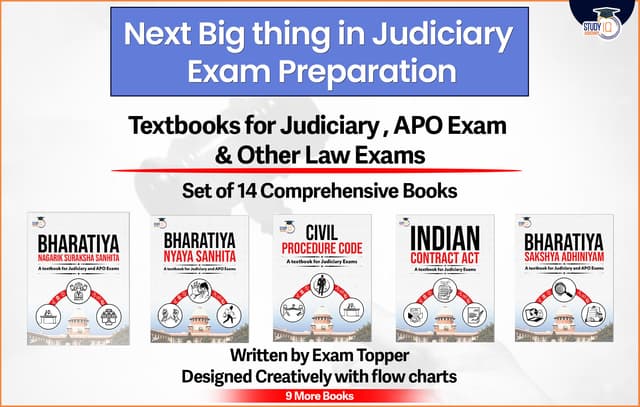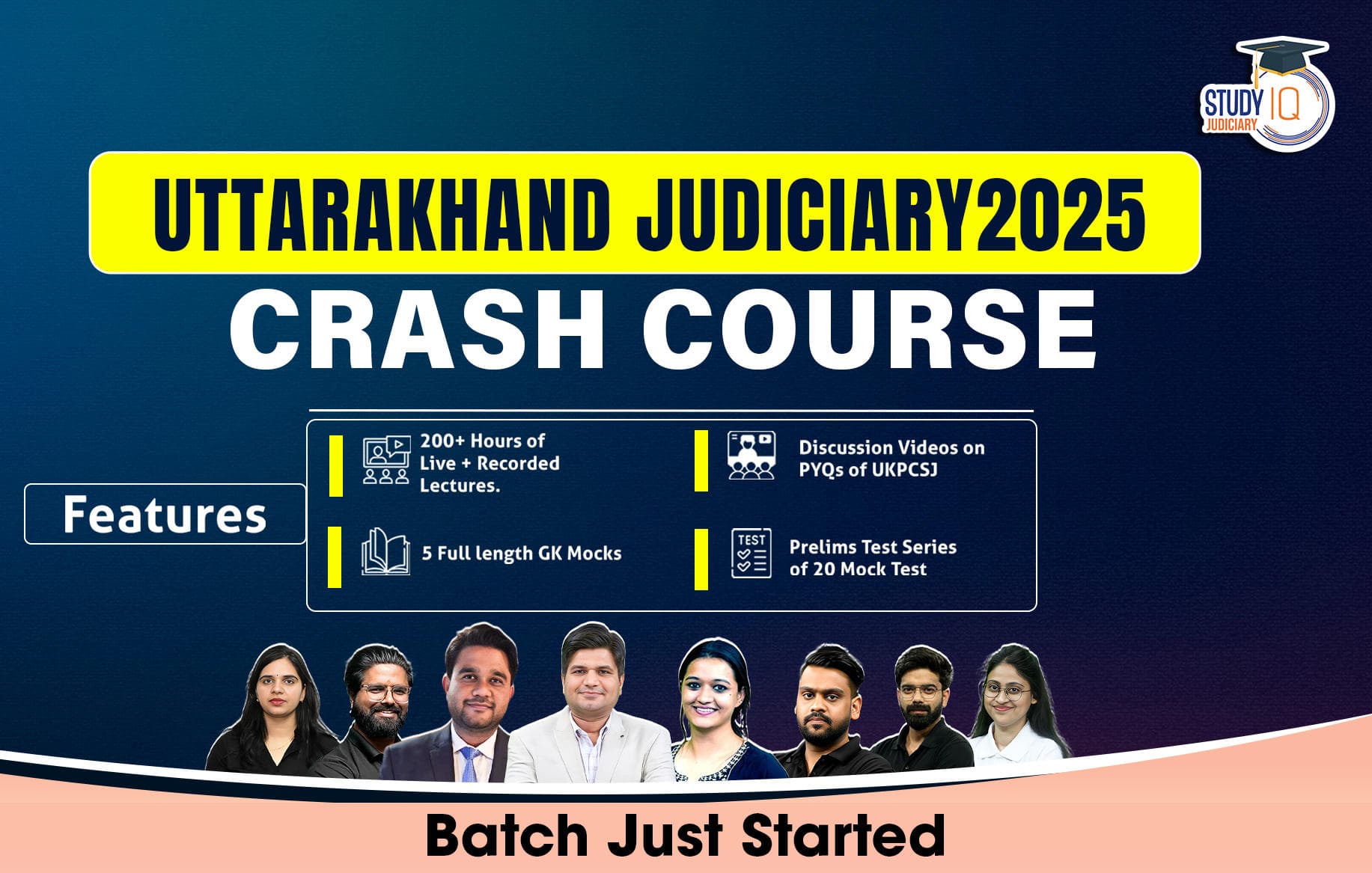Table of Contents
In a landmark judgment delivered on July 25, 2025, the Supreme Court of India issued comprehensive and binding guidelines to safeguard the mental health of students in educational institutions and coaching centres. This came in response to a tragic case involving a 17-year-old NEET aspirant who died under suspicious circumstances while undergoing coaching at a private institute in Visakhapatnam. The case—Sukdeb Saha v. State of Andhra Pradesh & Ors., 2025 LiveLaw (SC) 740—has reignited National attention on the mental health crisis faced by students, especially those preparing for high-stakes competitive examinations.
Recognising the absence of a uniform regulatory framework to address student suicides and mental health issues, the Court invoked Article 21 of the Constitution, declaring mental health an integral component of the right to life and dignity.
Constitutional Foundation: Article 21 and Mental Health
Article 21 of the Constitution states:
“No person shall be deprived of his life or personal liberty except according to procedure established by law.”
The Supreme Court, through a consistent line of judgments, has expanded the interpretation of Article 21 beyond mere physical survival to include dignity, autonomy, and psychological well-being. Citing Shatrughan Chauhan v. Union of India and Navtej Singh Johar v. Union of India, the Court reiterated that mental health, psychological autonomy, and freedom from degrading treatment are essential elements of a life with dignity.
The Court further relied on the Mental Healthcare Act, 2017, which:
- Recognises every individual’s right to access mental health services (Section 18),
- Decriminalises attempted suicide (Section 115),
- Obligates the State to protect and promote mental health through supportive measures, not punitive responses.
The ruling thus consolidates jurisprudence that aligns mental health with fundamental Constitutional values.
Judicial Observations on the Crisis in Education
The Court severely criticised the rank-oriented and performance-driven ecosystem prevalent in India’s educational and coaching institutions. It observed that education, which should nurture growth and self-worth, has instead become a source of relentless psychological pressure.
Quoting from the judgment:
“In this paradigm, life becomes a series of tests, and failure is seen not as a part of growth but as a devastating end.”
The Court denounced coaching institutes’ toxic practices such as segregation of students, disproportionate academic targets, and public shaming, holding them responsible for cultivating anxiety and depression among youth.
Framework for Mental Health Protection

In the absence of central legislation, the Court issued fifteen binding guidelines to remain in force until appropriate statutory regulations are enacted. Main highlights include:
- Mandatory Mental Health Policy: Institutions must adopt a uniform policy aligned with initiatives like UMMEED, MANODARPAN, and the National Suicide Prevention Strategy.
- Qualified Mental Health Personnel: Schools and colleges with 100+ students must appoint at least one trained counsellor or psychologist.
- No Academic Segregation: Coaching centres must stop batch segregation based on performance or assigning unrealistic targets.
- Suicide Prevention Infrastructure: Helpline numbers must be visibly displayed across campuses, and emergency response protocols must be established.
- Staff Training: Mandatory bi-annual training for teachers and non-teaching staff on identifying psychological distress and providing first-line support.
- Inclusive Engagement: Special sensitivity towards students from marginalised and vulnerable backgrounds, including SC/ST/OBC, LGBTQ+, disabled, and bereaved students.
- Anti-Harassment Framework: Establishment of grievance redressal mechanisms for incidents related to sexual harassment, bullying, caste or gender-based violence.
- Parental Sensitisation: Orientation programmes to educate parents on recognising distress and avoiding undue academic pressure.
- Annual Mental Health Reports: Institutions must submit anonymised wellness reports to regulatory bodies like UGC, AICTE, or CBSE.
- Focus on Holistic Development: Emphasis on extracurriculars, regular career counselling, and reduced exam-centric stress.
Special mention was made of high-pressure hubs like Kota, Jaipur, Sikar, Hyderabad, and Delhi, where enhanced vigilance and regulation were ordered.
International Law and India’s Global Commitments
The judgment also invoked India’s international obligations under:
- International Covenant on Economic, Social and Cultural Rights (ICESCR): Recognising the right to the highest attainable standard of mental health.
- Convention on the Rights of Persons with Disabilities (CRPD): Recognising psychosocial disabilities and promoting accessible mental health services.
- World Health Organization (WHO) Guidelines: Including the Comprehensive Mental Health Action Plan 2013–2020, which identifies suicide prevention as a public health priority.
The Court emphasised that these commitments convert mental health protections from policy aspirations into binding legal duties.
The Larger Judicial Vision: Right to Education, Dignity, and Life
This judgment is part of a larger judicial trend that upholds Constitutional morality over institutional inertia. By recognising mental health as inseparable from dignity, the Court has reinforced that:
- Right to education must be inclusive and nurturing, not burdensome.
- Failure to support students emotionally constitutes institutional negligence, which can attract regulatory consequences.
- Student suicides are not merely private tragedies but systemic failures warranting state accountability.
In doing so, the Court reaffirmed that fundamental rights are not confined to the classroom or courtroom, but must follow the student into hostels, coaching centres, and exam halls.
Conclusion
The Supreme Court’s ruling in Sukdeb Saha v. State of Andhra Pradesh serves as both a legal intervention and a moral call to action. It places mental health firmly within the domain of Constitutional rights and compels educational institutions to create nurturing, safe, and responsive environments.
While the guidelines provide immediate relief, the long-term goal must be the enactment of a comprehensive national law on student mental health, harmonised across schools, colleges, and coaching centres.
Mental health is not a luxury—it is a legal right, a human right, and a National imperative.


 Trial by Social Media: Public Shaming, D...
Trial by Social Media: Public Shaming, D...
 Governors’ Address to State Legislatur...
Governors’ Address to State Legislatur...
 Mandating Prior Approval for Corruption ...
Mandating Prior Approval for Corruption ...



















